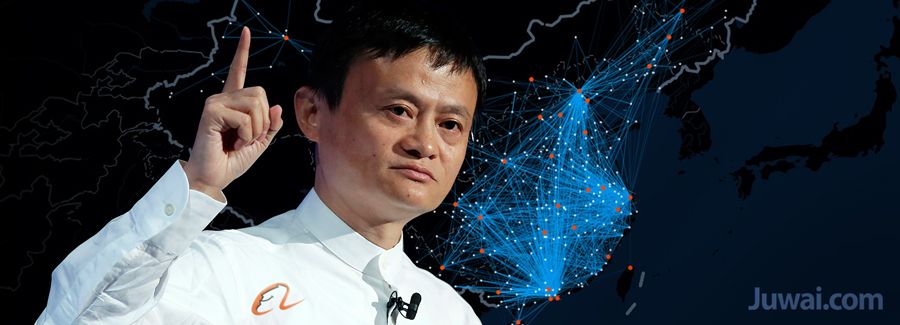You've successfully copied this link.
Why Alibaba is going rural this Chinese New Year

Alibaba has gone country – conquering even more of China to spur phenomenal sales growth, even amidst a slowing economy.1
Alibaba sales soared 32% to 34.5 billion yuan (US$5.2 billion) within the last three months of 2015, and its net income more than doubled to hit 12.5 billion yuan (US$1.89 billion).1
And Alibaba is keeping the ball rolling this Lunar New Year, going all out to continue its expansion into even the most far-flung reaches of China by unleashing a medley of promotions, subsidies, community events, charity projects, and more.2
This includes its recently launched promotion featuring a special train service – complete with "prosperity" gift bags and auspicious Spring Festival goodies – for migrant workers and students to return home for the Chinese New Year period2, which runs from 8-10 February this year.3
The joint train service project was a cooperation between the Guizhou Provincial Government and Cuntao – Alibaba’s e-commerce platform a.k.a “Rural Taobao” – and offered two trains that ran on from Guangzhou to Guizhou, and Shanghai to Xi'an.2
However, while Jack Ma’s e-commerce giant has recently been busy in all manner of fields, ranging from newspapers4 to movies5 to even football teams6, Alibaba is not about to launch its own national train service.
In fact, China’s e-commerce giant has got something much bigger in its sights.
World’s largest target market of 700 million people
What’s known as the ‘largest domestic migration in the world’7 is right bang in the center of Alibaba’s strategy.
Chinese New Year sees an estimated 700 million migrants leave China’s megacities – cities with a population of more than 10 million people8 – and major urban hubs, travelling to the fast-growing lower-tier cities and rural areas (most which are their hometowns) for a week-long bonanza of family reunion, eating, gift-giving, and shopping.9
Such massive numbers of people travelling all at the same time for Chinese New Year is what makes this holiday China’s peak travel and retail season.9
With this in mind, Alibaba recently launched a five-day ‘Farmer’s Market’ promotion10 targeted at domestic retailers and consumers, bringing discounts and special offers from online outlets to China’s estimated 688 million online shoppers11 looking to splash out during the festive period.
And it’s not all about domestic businesses, particularly with Chinese buyers’ burgeoning cross-border mentality driving ravenous demand for overseas products.
Alibaba has online shopping pavilions for the festival that offer goods from eight representative countries – including Australia, Korea, the US, and France12 – as well as specialised shopping platforms from eight global retailers, including Costco and Metro.
For the first time, China's rural community will be able to have access to over 500 international big brands, such as Uniqlo, Estee Lauder, Lancôme, and Huggies.10
Connecting China’s urban cities and rural countrysides
China's vast landmass has been a major hurdle for many retailers trying to make inroads into China's market. However, it is seemingly no problem at all for Alibaba.
Leaning on Cuntao’s distribution service and affliate Cainiao Logistics10, Alibaba is able to deliver both domestic and international brands to buyers across the breadth of the mainland.
Cuntao's distribution services includes 10,000 delivery pick-up services that covers over 270 counties and approximately 13,000 villages across China.10
Set up like this, returnees on the way home can reserve their treats ahead of the festival and pick them up when they get home, saving the hassle of traipsing around shopping centres in a mad rush before the festivities begin.
Already, initial signs are pointing towards a rip-roaring success, according to iFeng.13
Within half a day of launching ‘Farmers Market’, one retailer reported selling a whopping 10,000 pounds of Uncle Yang’s spicy sausage (a staple Chinese New Year treat) whilst another retailer reported selling a 17,000 kilos of Xinjiang lamb snacks.12
Alibaba is eyeing a bigger item on the menu, though – it's building a network of distributors in lower-tier cities and rural areas to tap into what the Chinese government reports as the country’s fastest-growing retail markets.14
What’s more, the company’s focus on these markets demonstrates it capacity to reach deep into the mainland market, a challenge that retailers have been struggling to overcome for some time.
Online platform bridges monster market
With Alibaba’s promotion in mind, it’s the opportunity for ‘smart expansion’ via online platforms that is resonating with major retailers looking at the China market – particularly at a time when many firms are revaluating their China strategies.
To prove the point, a steady stream of major retailers, including global FMCG giant Nestle, Zara, Adidas, Gap, and Macy’s15, have already signed up to Alibaba’s network during the past year.
To these retailers – many of them already successful in China – the value of a solid online platform cannot, and must not, be underestimated.
Now with big names from both in and out of China getting into the mix, the case for China’s online market is becoming even more solid.
Clearly, it’s time to climb aboard to capitalise on China’s fast-growing consumer market, and there’s no time like present because this Chinese New Year period is looking set to be bigger than ever.
So much so, that the People’s Bank of China (PBOC) has injected an extra 1.5 trillion yuan (US$192.5 billion) into the banking system to cope with what’s expected to be a huge demand for cash amidst a major retail bonanza.16
Sources:1. Bloomberg; 2. Ying Xiang News; 3. China Highlights: Chinese New Year 2016; 4. Hong Kong Free Press; 5. Wikipedia: Alibaba Pictures; 6. Bloomberg; 7. Gizmodo; 8. The Economist; 9. KPMG: Social and economic impact of Chinese New Year; 10. SCMP; 11. CNNIC on Digitimes; 12. Inside Retail; 13. iFeng.com; 14. Shanghai Daily; 15. Reuters; 16. Econotimes;
Liked this article? Sign up for free to get Juwai Juwai Asia Market updates!
2025 © Juwai. All Rights Reserved Privacy Policy | Terms of Service


